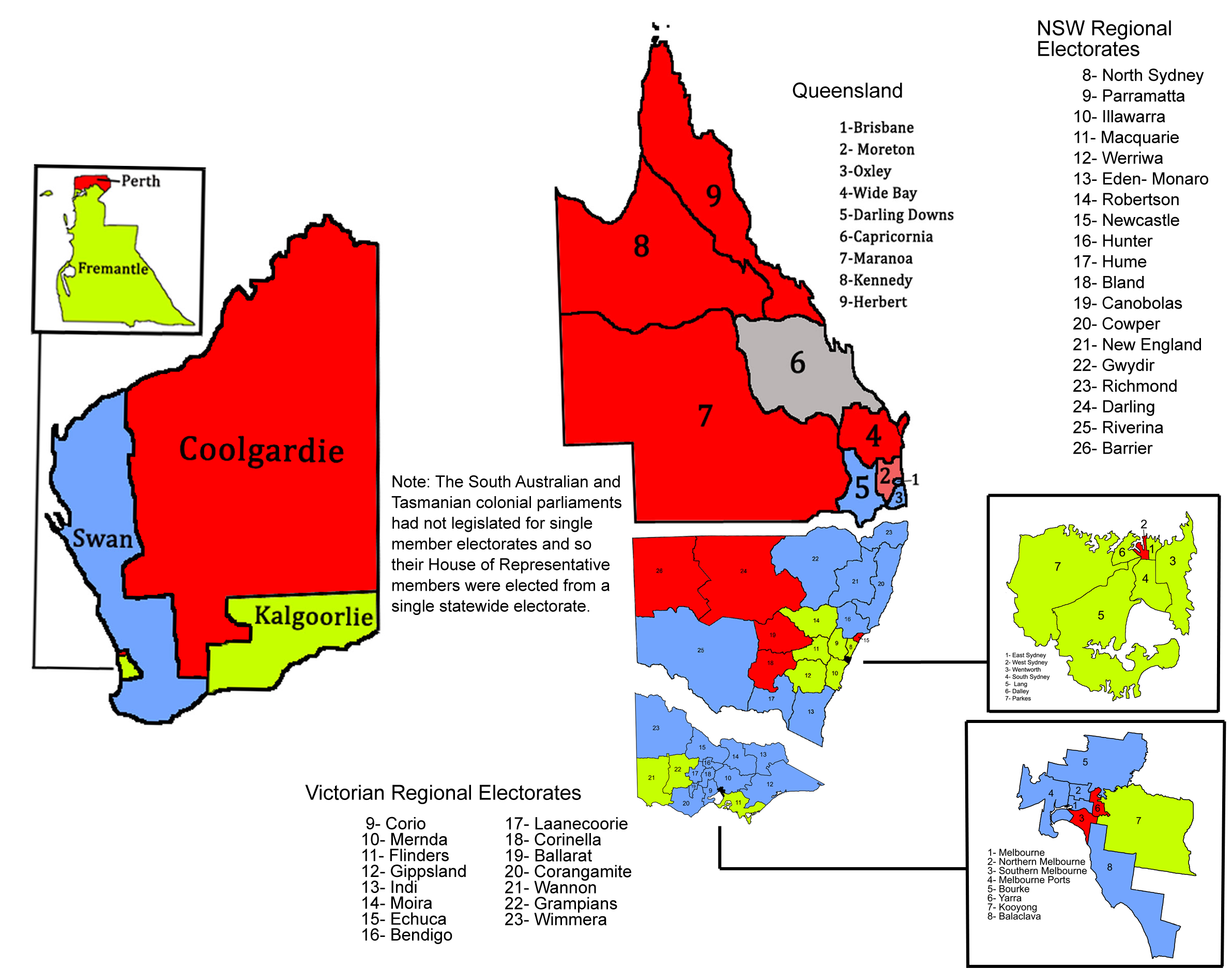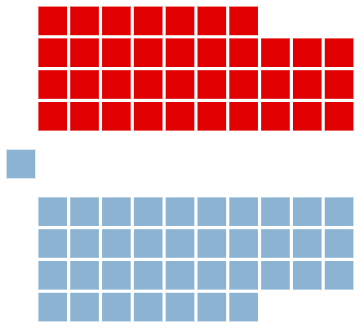|
Division Of Mernda
The Division of Mernda was an Australian electoral division in the state of Victoria. It was named after the town of Mernda, now a suburb in the City of Whittlesea in the northern suburbs of Melbourne. It originally included the towns of Lilydale and Mitcham, now suburbs, and the towns of Seymour and Yea. It was redistributed on 13 July 1906 to include the towns of Gisborne and Kyneton. The division was proclaimed in 1900, and was one of the original 65 divisions to be contested at the first federal election. It was abolished at the redistribution of 1 February 1913. Members See also * Electoral results for the Division of Mernda {{DEFAULTSORT:Mernda, Division Of 1901 establishments in Australia Constituencies established in 1901 Mernda Mernda is a suburb of Melbourne, Victoria, Australia, 28 km north-east of Melbourne's central business district, located within the City of Whittlesea local government area. Mernda recorded a population of 23,369 at t ... [...More Info...] [...Related Items...] OR: [Wikipedia] [Google] [Baidu] |
Mernda
Mernda is a suburb of Melbourne, Victoria, Australia, 28 km north-east of Melbourne's central business district, located within the City of Whittlesea local government area. Mernda recorded a population of 23,369 at the 2021 census. History The first structure by European settlers was built in 1841 and bore the title of The Bridge Inn. That same year a small flour mill was built on the Plenty River. These town enterprises provided the nucleus of a village which was initially known as Morang. The Post Office opened on 19 February 1875 as Yan Yean. Situated near the Yan Yean Reservoir and Yan Yean, the popularity of the region for recreation led Morang citizens to press for a name change. This was granted and from 1893 to 1913 the township was known as South Yan Yean. In 1913 the locality was renamed ''Mernda''. The post office and the railway station were also renamed. The name means young girl (derived from murmurdik) in Woiwurrung, the local language of the Wurundjeri ... [...More Info...] [...Related Items...] OR: [Wikipedia] [Google] [Baidu] |
1901 Australian Federal Election
The 1901 Australian federal election for the inaugural Parliament of Australia was held in Australia on Friday 29 March and Saturday 30 March 1901. The elections followed Federation and the establishment of the Commonwealth of Australia on 1 January 1901. All 75 seats in the Australian House of Representatives, six of which were uncontested, as well as all 36 seats in the Australian Senate, were up for election. After the initial confusion of the Hopetoun Blunder, the first Prime Minister of Australia, Edmund Barton, went into the inaugural 1901 federal election as the appointed head of a Protectionist Party caretaker government. While the Protectionists came first on votes and seats, they fell short of a majority. The incumbent government remained in office with the parliamentary support of the Labour Party, who held the balance of power, while the Free Trade Party formed the opposition. A few months prior to the 1903 election, Barton resigned to become a founding membe ... [...More Info...] [...Related Items...] OR: [Wikipedia] [Google] [Baidu] |
1901 Establishments In Australia
Nineteen or 19 may refer to: * 19 (number), the natural number following 18 and preceding 20 * one of the years 19 BC, AD 19, 1919, 2019 Films * ''19'' (film), a 2001 Japanese film * ''Nineteen'' (film), a 1987 science fiction film Music * 19 (band), a Japanese pop music duo Albums * ''19'' (Adele album), 2008 * ''19'', a 2003 album by Alsou * ''19'', a 2006 album by Evan Yo * ''19'', a 2018 album by MHD * ''19'', one half of the double album ''63/19'' by Kool A.D. * ''Number Nineteen'', a 1971 album by American jazz pianist Mal Waldron * ''XIX'' (EP), a 2019 EP by 1the9 Songs * "19" (song), a 1985 song by British musician Paul Hardcastle. * "Nineteen", a song by Bad4Good from the 1992 album ''Refugee'' * "Nineteen", a song by Karma to Burn from the 2001 album ''Almost Heathen''. * "Nineteen" (song), a 2007 song by American singer Billy Ray Cyrus. * "Nineteen", a song by Tegan and Sara from the 2007 album '' The Con''. * "XIX" (song), a 2014 song by Slipknot. ... [...More Info...] [...Related Items...] OR: [Wikipedia] [Google] [Baidu] |
Electoral Results For The Division Of Mernda
This is a list of electoral results for the Division of Mernda in Australian federal elections from the division's creation in 1901 until its abolition in 1913. Members Election results Elections in the 1910s 1910 Elections in the 1900s 1906 1903 1901 References * Australian Electoral Commission The Australian Electoral Commission (AEC) is the independent federal agency in charge of organising, conducting and supervising federal Australian elections, by-elections and referendums. Responsibilities The AEC's main responsibility is to ...Federal election results* Carr, AdamPsephos {{DEFAULTSORT:Mernda Australian federal electoral results by division ... [...More Info...] [...Related Items...] OR: [Wikipedia] [Google] [Baidu] |
1913 Australian Federal Election
The 1913 Australian federal election was held in Australia on 31 May 1913. All 75 seats in the House of Representatives, and 18 of the 36 seats in the Senate were up for election. The incumbent Labor Party, led by Prime Minister Andrew Fisher, was defeated by the opposition Commonwealth Liberal Party under Joseph Cook. The new government had a majority of just a single seat, and held a minority of seats in the Senate. It would last only 15 months, suffering defeat at the 1914 election. The 1913 election was held in conjunction with six referendum questions, none of which were carried. According to David Day, Andrew Fisher's biographer, "it was probably the timing of the referenda that was most responsible for the disappointing election result" for the Labor Party. Results House of Representatives ---- ;Notes * Three members were elected unopposed – one Liberal and two Labor. Senate Seats changing hands * Members listed in italics did not contest their seat at t ... [...More Info...] [...Related Items...] OR: [Wikipedia] [Google] [Baidu] |
Commonwealth Liberal Party
The Liberal Party was a parliamentary party in Australian federal politics between 1909 and 1917. The party was founded under Alfred Deakin's leadership as a merger of the Protectionist Party and Anti-Socialist Party, an event known as the Fusion. The creation of the party marked the emergence of a two-party system, replacing the unstable multi-party system that arose after Federation in 1901. The first three federal elections produced hung parliaments, with the Protectionists, Free Traders, and Australian Labor Party (ALP) forming a series of minority governments. Free Trade leader George Reid envisioned an anti-socialist alliance of liberals and conservatives, rebranding his party accordingly, and his views were eventually adopted by his Protectionist counterpart Deakin. Objections towards Reid saw Deakin take the lead in coordinating the merger. The Fusion was controversial, with some of his radical supporters regarding it as a betrayal and choosing to sit as independents ... [...More Info...] [...Related Items...] OR: [Wikipedia] [Google] [Baidu] |
Electoral District Of East Bourke
East Bourke (also known as Bourke East from around 1891) was an Electoral districts of Victoria, electoral district of the Victorian Legislative Assembly, Legislative Assembly in the Australian state of Victoria (Australia), Victoria from 1856 until being abolished by the post-Federation of Australia, Federation Electoral Districts Boundaries Act 1903 coming into effect in 1904. The district of East Bourke was one of the initial districts of the first Victorian Legislative Assembly, 1856. Members for East Bourke Two members initially, one from the redistribution of 1877. Notes = resigned = by-election References * {{DEFAULTSORT:East Bourke Former electoral districts of Victoria (state) 1856 establishments in Australia 1904 disestablishments in Australia ... [...More Info...] [...Related Items...] OR: [Wikipedia] [Google] [Baidu] |
Victorian Legislative Assembly
The Victorian Legislative Assembly is the lower house of the bicameral Parliament of Victoria in Australia; the upper house being the Victorian Legislative Council. Both houses sit at Parliament House in Spring Street, Melbourne. The presiding officer of the Legislative Assembly is the Speaker. There are presently 88 members of the Legislative Assembly elected from single-member divisions. History Victoria was proclaimed a Colony on 1 July 1851 separating from the Colony of New South Wales by an act of the British Parliament. The Legislative Assembly was created on 13 March 1856 with the passing of the ''Victorian Electoral Bill'', five years after the creation of the original unicameral Legislative Council. The Assembly first met on 21 November 1856, and consisted of sixty members representing thirty-seven multi and single-member electorates. On the Federation of Australia on 1 January 1901, the Parliament of Victoria continued except that the colony was now called a state. I ... [...More Info...] [...Related Items...] OR: [Wikipedia] [Google] [Baidu] |
Protectionist Party
The Protectionist Party or Liberal Protectionist Party was an Australian political party, formally organised from 1887 until 1909, with policies centred on protectionism. The party advocated protective tariffs, arguing it would allow Australian industry to grow and provide employment. It had its greatest strength in Victoria and in the rural areas of New South Wales. Its most prominent leaders were Sir Edmund Barton and Alfred Deakin, who were the first and second prime ministers of Australia. History The party was initially centred on New South Wales, where its leaders were George Dibbs and William Lyne. It dominated New South Wales colonial politics before federation. It first contested the 1887 New South Wales election. On the commencement of the Commonwealth of Australia, Governor-General-designate, The 7th Earl of Hopetoun, appointed Edmund Barton (after the Hopetoun Blunder), leader of the Protectionist Party, to head a caretaker government from 1 January 1901 ... [...More Info...] [...Related Items...] OR: [Wikipedia] [Google] [Baidu] |
Robert Harper (Australian Politician)
Robert Harper (1 February 1842 – 9 January 1919) was an Australian politician. Born in Glasgow, Scotland, he was educated at Glasgow Academy and migrated to Australia in 1856, becoming a tea and coffee merchant and a pastoralist. In 1879, he was elected to the Victorian Legislative Assembly as the member for West Bourke; he was defeated in 1880, but in 1882 returned to the Assembly as the member for East Bourke. He was defeated again in 1889, but was returned as member for East Bourke 1891–97. In the first federal election in 1901, he was elected to the Australian House of Representatives as the Protectionist member for Mernda. He joined the Commonwealth Liberal Party The Liberal Party was a parliamentary party in Australian federal politics between 1909 and 1917. The party was founded under Alfred Deakin's leadership as a merger of the Protectionist Party and Anti-Socialist Party, an event known as the Fus ... when it was formed out of the fusion of the Protectionis ... [...More Info...] [...Related Items...] OR: [Wikipedia] [Google] [Baidu] |
Robert Harper (Australia)
Robert or Bob Harper may refer to: * Robert Almer Harper (1862–1946), American botanist * Robert Goodloe Harper (1765–1825), US senator from Maryland * Robert Harper (fl. 1734–1761), founder of Harpers Ferry, West Virginia * Robert Harper (actor) (1951–2020), American actor * Robert Harper (Australian politician) (1842–1919), member of the Australian House of Representatives * Robert Harper (computer scientist) (born 1957), computer science professor at Carnegie Mellon University * Robert Harper (conveyancer) (1700–1772), English conveyancer and drafter of parliamentary bills * Robert Harper (cricketer) (born 1948), South African cricketer * Robert Newton Harper (1861–1940), president of the District of Columbia Pharmaceutical Association * Bob Harper (Ontario politician) * Bob Harper (personal trainer) (born 1965), American personal trainer and author * Bob Harper (politician) (1944–2017), Australian politician * Bob Harper (producer) (born 1955), Hollywood film pro ... [...More Info...] [...Related Items...] OR: [Wikipedia] [Google] [Baidu] |
List Of Australian Electorates Contested At Every Election
Of the 65 federal electoral divisions first contested at the 1901 election, 33 are still in existence without ever being abolished. These are referred to as Federation Divisions, with the Australian Electoral Commission's redistribution guidelines stating that "Every effort should be made to retain the names of original federation divisions". * The Division of Riverina was abolished in 1984 and re-created in 1993, so has not been contested at every election. * Although there were 75 members in the House of Representatives in 1901, there were only 65 divisions contested as the states of South Australia and Tasmania consisted of single multi-member divisions electing 7 and 5 members respectively. In the state parliaments: * In New South Wales, there is only one of the original 34 contested in 1856 that still exists. * In Victoria, three of the original 37 contested in 1856 still exist. * In Queensland there is only one of the original 16 contested in 1860. * In South Australia ... [...More Info...] [...Related Items...] OR: [Wikipedia] [Google] [Baidu] |


